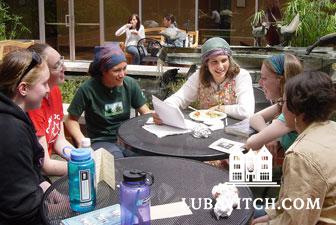Corkscrew willow branches twist in serpentine curves, quite an unusual wood to use for fence-building, but Aviva Spiegel selected it to create a gate around the Chabad House of Eugene, OR. An offbeat choice, but a natural one for a woman who takes special pleasre in building bridges between Jews by defying typecasting.
“When people first approach our Chabad house, and they see that it is not very conventional, not what they would expect from a religious Jew, I am able to blow the stereotype a bit,” Aviva told Lubavitch.com.
Rabbi Asi and Aviva Spiegel arrived in Eugene in 2002, seeking a community as nonconformist as they are. Two hours south of Portland, Eugene is as green as the 150,000 eco-loving organic foodies living there, and as liberal as it is isolated from a major metropolitan Jewish community. When locals and Jewish students at University of Oregon join a Chabad activity, the Spiegels are often the only observant Jews they’ve met. Aviva’s creative flair squelches fears that getting involved with Judaism quashes self-expression.
The daughter of a dermatologist, Aviva grew up in California, attended Jewish camps affiliated with the Reform movement. With high grades and scores, she easily snagged a spot in Stanford University. During college, an interest in alternative healing sparked Aviva’s spiritual journey. Mind-body-soul connections evident in Chinese medicine, India’s Ayurvedic therapies led Aviva on a quest to find the Jewish way of healing. On a grant from Stanford, Aviva traveled to Israel for research. The number of religious Jews in Israel involved in alternative medicine staggered her. “How could such conservative people practice such far out medicine?” Her conclusion that Judaism sees emotional, physical and spiritual lives as a whole piqued her pursuit of Jewish knowledge.
Several years and yeshivas later, she married Rabbi Asi Spiegel. His unconventional background includes his upbringing in Israel, the son of a Bar Ilan University professor, and a reputation for being something of a folk musician, acoustic guitar and all. In their honeymoon years, the Spiegels lived in Brooklyn. Aviva planted a flowerpot garden on her balcony and painted it with a rainbow of butterflies and flowers. Neighbors noticed, commented kindly, but Aviva “felt like a fish out of water.” Moving to Oregon was more than a change of coasts.
“The whole Eugene is creative. I completely blend in, in that particular aspect.”
Aviva capitalizes on the benefits of living in a community where artsy isn’t a pejorative. At her classes for women, molding clay and homemade honey facials are as much a part of the curriculum as rabbinical commentaries. She uses the hands-on crafts to give participants a medium to “process what they have learned” and provide a physical vessel for the spiritual concepts.
At Chabad of Eugene, the atypical collides with the expected. Students are as likely to be bowled over by the front steps Aviva tiled in a colorful mosaic as they are by the Spiegels’ four young children. Fanciful artwork hangs alongside pictures of Chabad rabbis. Organic cookbooks share shelf space with volumes of Chasidic philosophy. Aviva figures the mix is a good primer for her community.
“If they were able to drop their preconceptions and get to know me,” said Aviva, “then they can have the same experience with other religious Jews if they give it a chance.”

Be the first to write a comment.